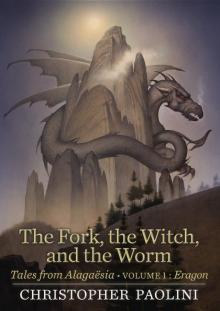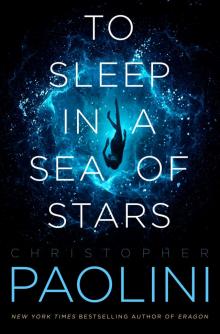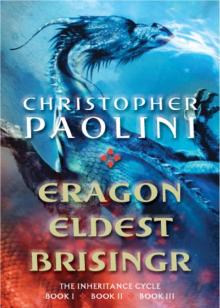- Home
- Christopher Paolini
To Sleep in a Sea of Stars Page 3
To Sleep in a Sea of Stars Read online
Page 3
At least the temperature’s bearable, thought Kira. She wouldn’t even have to turn on the heater in her skinsuit.
She climbed into the narrow airlock and pulled the inner hatch shut behind her. It closed with a metallic boom.
“Atmosphere exchange initialized; please stand by,” said Geiger in her ear.
The indicator turned green. Kira spun the wheel in the center of the outer hatch and then pushed. The seal broke with a sticky, tearing sound, and the reddish light of Adrasteia’s sky flooded the airlock.
The island was an unlovely heap of rocks and rust-colored soil, large enough that she couldn’t see the far side, only the near coast. Beyond the edge of land spread an expanse of grey water, like a sheet of hammered lead, the tips of the waves highlighted with the ruddy light from the cloudless sky. A poison ocean, heavy with cadmium, mercury, and copper.
Kira jumped down from the airlock and closed it behind her. She frowned as she studied the telemetry from the downed drone. The organic material it had detected wasn’t by the water, as she’d expected, but rather at the top of a wide hill a few hundred meters to the south.
Okay then. She made her way across the fractured ground, picking her steps with care. As she walked, blocks of text popped up in front of her, providing info on the chemical composition, local temperature, density, likely age, and radioactivity of different parts of the landscape. The scanner on her belt fed the readings into her overlays while simultaneously transmitting them back to the shuttle.
Kira dutifully reviewed the text but saw nothing new. The few times she felt compelled to take a soil sample, the results were as boring as ever: minerals, traces of organic and pre-organic compounds, and a scattering of anaerobic bacteria.
At the top of the hill, she found a flat spread of rock scored with deep grooves from the last planetary glaciation. A patch of orange, lichen-like bacteria covered much of the rock. Kira recognized the species at first glance—B. loomisii—but she took a scraping just to confirm.
Biologically, there wasn’t much of interest on Adrasteia. Her most notable find had been a species of methane-eating bacteria beneath the arctic ice sheet—bacteria that had a somewhat unusual lipid structure in their cellular walls. But that was it. She’d write up an overview of Adrasteia’s biome, of course, and if she was lucky, she might get it published in a couple of the more obscure journals, but it wasn’t much to crow about.
Still, the absence of more developed forms of life was a plus when it came to terraforming: it left the moon a lump of raw clay, suitable for remolding however the company, and the settlers, saw fit. Unlike on Eidolon—beautiful, deadly Eidolon—they wouldn’t have to be constantly fighting the native flora and fauna.
While Kira waited for her chip-lab to finish its analysis, she walked to the crest of the hill, took in the view of the rough-scraped rocks and the metallic ocean.
She frowned as she remembered how long it would be before they could stock the oceans with anything more than gene-spliced algae and plankton.
This is going to be our home. It was a sobering thought. But not depressing. Weyland wasn’t much friendlier, and Kira remembered the massive improvements she had seen on the planet over the course of her childhood: once-barren dirt converted to fertile soil, the spread of green growing things across the landscape, the ability to walk around outside for a limited time without supplemental oxygen. She had optimism. Adrasteia was more habitable than 99-some percent of the planets in the galaxy. By astronomical standards, it was an almost perfect analogue for Earth, more similar than a high-g planet like Shin-Zar, and even more similar than Venus, with its floating cloud cities.
Whatever the difficulties Adrasteia presented, she was willing to face them if it meant she and Alan could be together.
We’re getting married! Kira grinned and lifted her arms overhead, fingers splayed, and stared straight up, feeling as if she were about to burst. Nothing had ever felt so right.
A high-pitched beep sounded in her ear.
3.
The chip-lab had finished. She checked the readout. The bacteria was B. loomisii, as she’d thought.
Kira sighed and turned off the device. Mendoza had been right—it was their responsibility to check out the growth—but it was still a huge waste of time.
Whatever. Back to HQ and Alan, and then they could blast off for the Fidanza.
Kira started to leave the hill, and then, out of curiosity, she looked toward where the drone had crashed. Neghar had IDed and tagged the location during the shuttle’s descent.
There. A klick and a half from the coast, near the center of the island, she saw a yellow box outlining a patch of ground next to …
“Huh.”
A formation of jagged, pillar-shaped rocks stabbed out of the ground at a steep, sideways angle. In all the places Kira had visited on Adra—and they were many—she hadn’t seen anything quite like it.
“Petra: select visual target. Analyze.”
Her system responded. An outline flashed around the formation, and then a long list of elements scrolled next to it. Kira’s eyebrows rose. She wasn’t a geologist like Alan, but she knew enough to realize how unusual it was to have so many elements clustered together.
“Thermals up,” she muttered. Her visor darkened, and the world around her became an impressionistic painting of blues, blacks, and—where the ground had absorbed the warmth of the sun—muted reds. As expected, the formation perfectly matched the ambient temperature.
Less than a minute later:
She smirked and swapped out of the infrared as she started down the hill. “Neghar, do you read?”
A crackle of static and then: *What’s up?*
“I’m going to be another half hour or so. Sorry.”
*Dammit! Those rolls aren’t going to last more than—*
“I know. There’s something I have to investigate for Alan.”
*What?*
“Some rocks, farther inland.”
*You’re gonna give up Yugo’s cinnamon rolls for THAT?*
“Sorry, you know how it is. Besides, haven’t seen anything quite like this before.”
A moment of silence. *Fine. But you better haul ass, you hear me?*
“Roger that, hauling ass,” said Kira. She chuckled and quickened her pace.
Where the uneven ground allowed, she jogged, and ten minutes later, she arrived at the tilted outcropping. It was bigger than she’d realized.
The highest point was a full seven meters overhead, and the base of the formation was over twenty meters across: wider even than the shuttle was long. The broken cluster of columns, black and faceted, reminded her of basalt, but their surface had an oily sheen similar to that of coal or graphite.
There was something about the appearance of the rocks that Kira found off-putting. They were too dark, too stark and sharp-edged, too different from the rest of the landscape—a ruined spire alone amid the granite wasteland. And though she knew it was her imagination, an uneasy air seemed to surround the outcropping, like a low vibration just strong enough to annoy. Were she a cat, Kira felt sure her hair would be standing on end.
She frowned and scratched her forearms.
It sure didn’t look like there’d been a volcanic eruption in the area. Okay then, a meteor strike instead? But that didn’t make sense either. No blast wall or crater.
She walked around the base, scanning. Near the back, she spotted the remnants of the drone
: a long strip of broken and melted components dashed against the ground.
Hell of a lightning strike, Kira thought. The drone must have been going pretty fast to spread it out like that.
She shifted in her suit, still feeling uneasy. Whatever the formation was, she decided she’d leave the mystery for Alan to figure out. It would give him something to do on the flight out of the system.
She took a soil sample and then searched until she found a small piece of the black rock that had flaked off. She held it up to the sun. It had a distinct crystalline structure: a fish-scale-like pattern that reminded her of woven carbon fiber. Impact crystals? Whatever it was, it was unusual.
She tucked the rock into a sample pouch and gave the formation one last look-over.
A silvery flash, several meters off the ground, caught her eye.
Kira paused, studying it.
A crack had split open one of the columns to reveal a jagged white seam within. She checked her overlays: the seam was too deep within the crack to get a good reading. The only thing the scanner could tell her for sure was that it wasn’t radioactive.
The comm crackled, and Neghar said, *How ya doing, Kira?*
“Almost done.”
*’K. Hurry up, would you?*
“Yeah, yeah,” Kira muttered to herself.
She eyed the crack, trying to decide if it was worth the effort to climb up and examine. She nearly contacted Alan to ask but then decided not to bother him. If she didn’t find out what the seam was, she knew the question would annoy him until they, hopefully, returned to Adra and he got a chance to examine it himself.
Kira couldn’t do that to him. She’d seen him stay up late far too many times, poring over blurred footage from a drone.
Besides, the crack wasn’t that hard to reach. If she started there and went over to that, then maybe … Kira smiled. The challenge appealed to her. The skinsuit didn’t have gecko pads installed, but it shouldn’t matter, not for an easy climb like this.
She walked to a slanted column that ended only a meter above her head. Sucking in a quick breath, she dipped her knees and jumped.
The rough edge of the stone dug into her fingers as she caught hold of it. She swung a leg over the top of the column and then, with a grunt, pulled herself up.
Kira stayed on all fours, clutching the uneven stone while she waited for her heart to slow. Then she carefully got to her feet atop the column.
From there it was relatively easy. She jumped across to another angled column, which allowed her to scramble up several more, like climbing a giant staircase, aged and crumbling.
The last meter was a bit tricky; Kira had to wedge her fingers between two pillars in order to support herself as she swung from one foothold to another. Fortunately, there was a broad ledge beneath the crack she was trying to reach—broad enough that she had room to stand and move about.
She shook her hands to get the blood back into her fingers and walked over to the fissure, curious what she would find.
Up close, the gleaming white seam looked metallic and ductile, as if it were a vein of pure silver. Only it couldn’t be; it wasn’t tarnished.
She targeted the seam with her overlays.
Terbium?
Kira barely recognized the name. One of the elements in the platinum group, she thought. She didn’t bother looking it up, but she knew it was odd for a metal like that to appear in such a pure form.
She leaned forward, peering deeper into the crack as she tried to get a better angle for the scanner.…
Bang! The sound was as loud as a gunshot. Kira jerked with surprise, and then her foot slipped, and she felt the stone shift underneath her as the whole ledge gave way.
She was falling—
An image flashed through her mind of her body lying broken on the ground.
Kira yelped and flailed, trying to grab the column in front of her, but she missed and—
Darkness swallowed her. Thunder filled her ears and lightning shot across her vision as her head bounced against the rocks. Pain shot through her arms and legs as she was pummeled from every direction.
The ordeal seemed to last for minutes.
Then she felt a sudden sense of weightlessness—
—and a second later, she slammed into a hard, jagged mound.
4.
Kira lay where she was, stunned.
The impact had knocked the breath out of her. She tried to fill her lungs, but her muscles wouldn’t respond. For a moment she felt as if she were choking, and then her diaphragm relaxed and air rushed in.
She gasped, desperate for oxygen.
After the first few breaths, she forced herself to stop panting. No point in hyperventilating. It would only make it harder to function.
In front of her, all she saw was rock and shadow.
She checked her overlays: skinsuit still intact, no breaches detected. Elevated pulse and blood pressure, O2 levels high normal, cortisol through the roof (as expected). To her relief, she didn’t see any broken bones, although her right elbow felt as if it had been smashed by a hammer, and she knew she was going to be sore and bruised for days.
She wiggled her fingers and toes, just to test that they worked.
With her tongue, Kira tabbed two doses of liquid Norodon. She sucked the painkiller from her feeding tube and gulped it down, ignoring its sickly sweet taste. The Norodon would take a few minutes to reach full strength, but she could already feel the pain retreating to a dull ache.
She was lying on a pile of stone rubble. The corners and edges dug into her back with unpleasant insistence. Grimacing, she rolled off the mound and onto all fours.
The ground was surprisingly flat. Flat and covered with a thick layer of dust.
It hurt, but Kira pushed herself onto her feet and stood. The movement made her light-headed. She leaned on her thighs until the feeling passed and then turned and looked at her surroundings.
A ragged shaft of light filtered down from the hole she had fallen through, providing the only source of illumination. By it she saw that she was inside a circular cave, perhaps ten meters across—
No, not a cave.
For a moment she couldn’t make sense of what she was seeing, the incongruity was so great. The ground was flat. The walls were smooth. The ceiling was curved and dome-like. And in the center of the space stood a … stalagmite? A waist-high stalagmite that widened as it rose.
Kira’s mind raced as she tried to imagine how the space could have formed. A whirlpool? A vortex of air? But then there would be ridges everywhere, grooves … Could it be a lava bubble? But the stone wasn’t volcanic.
Then she realized. The truth was so unlikely, she hadn’t allowed herself to consider the possibility, even though it was obvious.
The cave wasn’t a cave. It was a room.
“Thule,” she whispered. She wasn’t religious, but right then, prayer seemed like the only appropriate response.
Aliens. Intelligent aliens. A rush of fear and excitement swept through Kira. Her skin went hot, pinpricks of sweat sprang up across her body, and her pulse started to hammer.
Only one other alien artifact had ever been found: the Great Beacon on Talos VII. Kira had been four at the time, but she still remembered the moment the news had become public. The streets of Highstone had gone deathly quiet as everyone stared at their overlays, trying to digest the revelation that, no, humans weren’t the only sentient race to have evolved in the galaxy. The story of Dr. Crichton, xenobiologist and member of the first expedition to the lip of the Beacon, had been one of Kira’s earliest and greatest inspirations for wanting to become a xenobiologist herself. In her more fanciful moments, she had sometimes daydreamed of making a discovery that was equally momentous, but the odds of that actually happening had seemed so remote as to be impossible.
Kira forced herself to breathe again. She needed to keep a clear head.
No one knew what had happened to the makers of the Beacon; they were long dead or vanished, and nothing h
ad been found to explain their nature, origin, or intentions. Did they make this as well?
Whatever the truth, the room was a find of historic significance. Falling into it was probably the most important thing she would ever do in her life. The discovery would be news through the whole of settled space. There would be interviews, appearance requests; everyone would be talking about it. Hell, the papers she could publish … Entire careers had been built on far, far less.
Her parents would be so proud. Especially her dad; further proof of intelligent aliens would delight him like nothing else.
Priorities. First she had to make sure she lived through the experience. For all she knew, the room could be an automated slaughterhouse. Kira double-checked her suit readouts, paranoid. Still no breaches. Good. She didn’t have to worry about contamination from alien organisms.
She activated her radio. “Neghar, do you read?”
Silence.
Kira tried again, but her system couldn’t connect to the shuttle. Too much stone overhead, she guessed. She wasn’t worried; Geiger would have alerted Neghar something was wrong as soon as the feed from her skinsuit cut out. It shouldn’t be long before help arrived.
She’d need help, too. There was no way she could climb out by herself, not without gecko pads. The walls were over four meters high and devoid of handholds. Through the hole, she could see a blotch of sky, pale and distant. She couldn’t tell exactly how far she’d fallen, but it looked like enough to place her well below ground level.
At least it hadn’t been a straight drop. Otherwise she would probably be dead.
Kira continued to study the room, not moving from where she stood. The chamber had no obvious entrances or exits. The pedestal that she had originally believed to be a stalagmite had a shallow, bowl-like depression in the top. A pool of dust had gathered within the depression, obscuring the color of the stone.

 Eragon
Eragon Eldest
Eldest Brisingr
Brisingr The Fork, the Witch, and the Worm
The Fork, the Witch, and the Worm To Sleep in a Sea of Stars
To Sleep in a Sea of Stars![Eldest [en] i-2 Read online](http://i1.bookreadfree.com/i/03/19/eldest_en_i-2_preview.jpg) Eldest [en] i-2
Eldest [en] i-2 Inheritance i-4
Inheritance i-4![Brisingr [en] i-3 Read online](http://i1.bookreadfree.com/i1/03/31/brisingr_en_i-3_preview.jpg) Brisingr [en] i-3
Brisingr [en] i-3 Inheritance Cycle Omnibus
Inheritance Cycle Omnibus